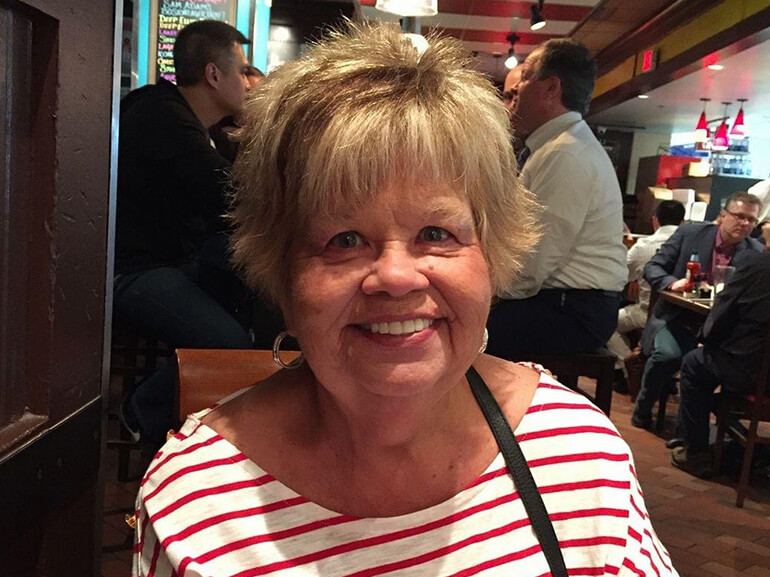Julie's Story

A native North Texan, Julie Jones, 67, was living a full life after retiring from her career as a teacher. While her husband Bill’s job required frequent, extended travel, Julie occupied herself by spending time with her two daughters and grandchildren, cooking and quilting. She also took on some part-time work as a personal chef several times a week.
Julie’s life took a dramatic turn one summer day. She and her family were planning to have a cookout, and Julie went out to the garage to check her freezer. Upon returning to the living room, her legs gave out. Julie’s daughter arrived at the home to find her mother on the floor and called 911. After being transported to a local emergency department, testing revealed that Julie had suffered a stroke. Julie was moved to the ICU at a larger hospital for further testing and treatment.
Once stabilized, Julie transferred to Select Rehabilitation Hospital of Denton for further recovery and rehabilitation as the stroke left her with a variety of deficits, particularly on her left side. Her family had received a recommendation about the hospital’s stroke program and recovery success rate and decided that it was the best next step in Julie’s journey.
Upon admission, Julie faced complications with her mobility. She struggled to walk, transfer in and out of bed and had difficulties independently completing personal care. As a result of the stroke, Julie also experienced challenges with her working memory, processing, ability to focus and retention of information. Additionally, Julie struggled to tolerate a regular diet due to swallowing difficulties.
Her goals included being independent and getting back to her prior level of function so she could drive, cook, sew and do things with her grandchildren. From day one, Julie was determined to put forth as much effort as possible.
In physical therapy, Julie’s therapists focused on tasks involving transferring in and out of bed, walking, wheelchair mobility and practicing going up and down stairs in order to improve her safety and independence once she returned home. Therapy sessions consisted of using specialized equipment, such as parallel bars and standing frames, to help with balance and body awareness. Therapists guided Julie in exercises to strengthen her legs and address the left-sided weakness, including using a rolling walker and balance activities to improve her standing tolerance and reduce her fall risk. Julie recalls her turning point in therapy was when she finally started walking with a walker and realized, “It’s all coming together.”
Occupational therapists worked with Julie to help regain strength so that she could relearn to perform basic tasks such as feeding herself, grooming, dressing, bathing and other personal care activities. They also coached Julie on using adaptive equipment and strategies to be more independent in the face of residual weakness from her stroke.
Julie and her speech therapists used a variety of treatments to help improve her processing speed, working memory, thought organization and recall of information needed to ensure she would be successful and safe upon returning home. Speech therapists also worked with Julie to slowly add different foods back into her diet while practicing oral motor exercises and providing training on swallowing strategies. At admission, Julie was only able to eat moist, finely chopped foods but was able to progress to a regular diet so she could enjoy the foods she preferred at meals. Bacon was a favorite.
Julie’s family played a vital role in her recovery through their support and love. Her family members attended training sessions so they could confidently and safely provide home care for Julie after discharge. This training also included hands-on training with the clinicians, a home evaluation prior to discharge as well as stroke education with informative resources.
By the time she was ready to be discharged after 26 days, Julie had made incredible strides in her recovery. She was able to walk with a rolling walker, requiring only minimal assistance and cueing for safety, and go up and down four steps. Julie could also complete her personal care with only minor assistance and had met all of her speech therapy goals.
With plans to continue physical and occupational therapy with home health, Julie reflected on her rehabilitation journey, specifically expressing her appreciation for how Select Rehabilitation Hospital of Denton provided family training and stroke education sessions which helped her learn that what she experienced was ‘normal’ following a stroke. Julie credits the different therapists on her team and the specific rehabilitation activities throughout her journey for boosting her confidence and abilities.
She shared, “These are great people here. I felt I could talk if I needed to talk, and no one made me feel uneasy.” Her advice to other stroke survivors is to "Do what you are told. Give it some time. We all want instant gratification, but healing and recovery doesn’t happen overnight.”